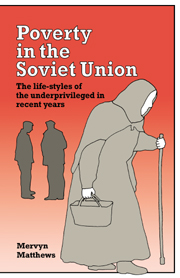Book contents
- Frontmatter
- Contents
- Preface
- PART I
- PART II
- 4 POVERTY LIFE-STYLES: OTHER ASPECTS
- 5 WORK AND SOCIAL SECURITY
- 6 POVERTY, POLITICS AND CHARITY
- 7 SOME FURTHER DIMENSIONS
- Postscript: Twelve theses on Soviet poverty
- Appendix 1 Samizdat and other unofficial documents
- Appendix 2 The emigre survey
- Notes
- Bibliography
- Index
5 - WORK AND SOCIAL SECURITY
from PART II
Published online by Cambridge University Press: 30 October 2009
- Frontmatter
- Contents
- Preface
- PART I
- PART II
- 4 POVERTY LIFE-STYLES: OTHER ASPECTS
- 5 WORK AND SOCIAL SECURITY
- 6 POVERTY, POLITICS AND CHARITY
- 7 SOME FURTHER DIMENSIONS
- Postscript: Twelve theses on Soviet poverty
- Appendix 1 Samizdat and other unofficial documents
- Appendix 2 The emigre survey
- Notes
- Bibliography
- Index
Summary
For most people, satisfactory employment is central to personal well-being. While able-bodied, they expect their labours to ensure a reasonable standard of living (though things may not always work out that way). They also reckon to maintain, either from their own purse, or with state help, dependents who are unable to work. When they are old or ill, they may well believe that earlier contributions to family and society give them a moral right to adequate sustenance. It would appear that these principles are generally accepted in Soviet society.
The Soviet authorities, for their part, have always displayed a particular sensitivity towards labour, both because it lies at the heart of Marxist theory, and because it serves as a good instrument of social control. They also lay great stress on the excellence of state provisions for people who are unable to work. So it behoves us to consider, in a little more detail, the main relationships between labour, social security, and poverty in the Soviet context.
We shall examine, more specifically, the laws by which Soviet citizens are encouraged to maintain themselves, and their families, through honest labour: and the arrangements made to help those who, for various reasons, do not work, or work enough. No analysis of poverty in the USSR would be complete without some account of government intervention in this sphere.
WORK AS A RIGHT AND AS A DUTY
The Soviet Constitution of 1977 contains some far-reaching undertakings with regard to labour. Like the document which preceded it, it lays considerable emphasis on toil both for the good of society and the benefit of the toiler.
- Type
- Chapter
- Information
- Poverty in the Soviet UnionThe life-styles of the underprivileged in recent years, pp. 106 - 125Publisher: Cambridge University PressPrint publication year: 1986



